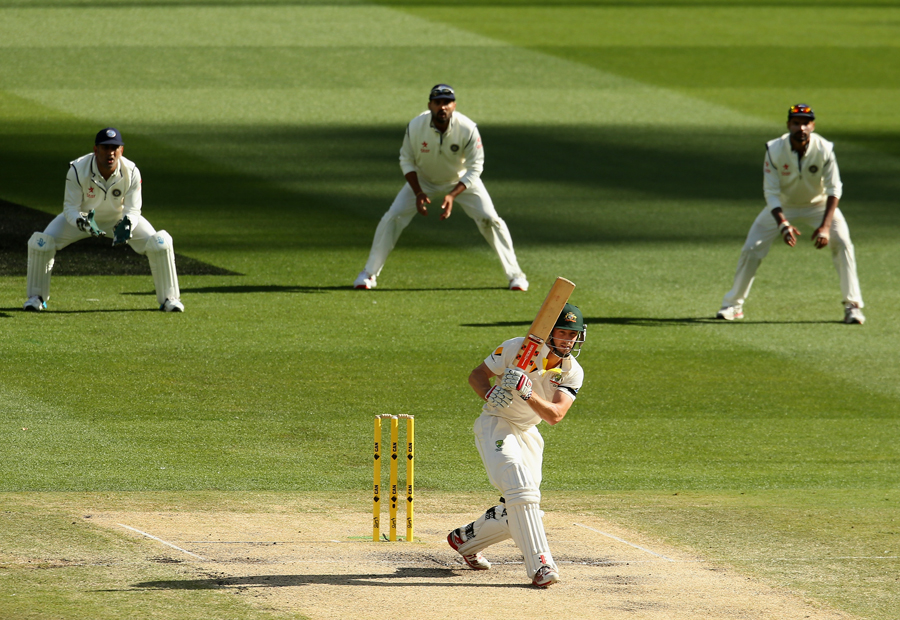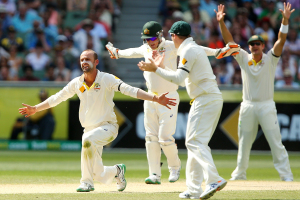A flat drop-in pitch. Possible rain. Brazen Indian batsmen. A brittle touring tail. Reverse swing. An extended day’s play. The Border-Gavaskar Trophy not quite secured. A new captain and an older coach. A commitment to entertain.
These were just a few of the variables for Australia after four days of the Boxing Day Test at the MCG, as the captain Steven Smith and the coach Darren Lehmann pondered the ideal target to set India on the final day of a contest that the hosts have largely dictated, albeit not firmly enough to keep the visitors beyond hope.
The cut and thrust of the final session, after two earlier brackets of less bracing stuff, left Australia to wonder how many overs they might need to bowl. Shaun Marsh drove, nudged and edged to his first Test 50 in Australia, following up on Chris Rogers’ fourth in succession. Smith failed for the first time this series, Shane Watson for the fifth, and David Warner’s smashing start was not sustained enough to rattle to a dominant lead.
At the forefront of Smith’s mind will be the fact that an Indian victory would keep the series open, and that at this ground a year ago Australia chased down a target of 231 against England with such speed and comfort that a tally twice that many may not have been out of the question. Melbourne’s drop-in pitch has shown precious few signs of deterioration.
Only four overs were lost despite an 86-minute rain interruption that delayed the resumption after lunch, and a series of Australian starts kept India interested for the fact that none pushed on to three figures. After India’s final two wickets fell to Mitchell Johnson, Warner shrugged off a sore thumb and bruised arm to punch his way to 40 from 42 balls. His dismissal to R Ashwin, who also pouched Rogers, slowed Australia’s scoring.
They had rolled up India’s tail with familiar ease in the morning. Mitchell Johnson had Umesh Yadav falling caught behind, fending at a short one, second ball of the day, before Mohammed Shami was taken by Steven Smith in the slips when he flashed at a fuller delivery.
Warner cut the first delivery of the innings, an obligingly wide offering from Umesh, to the backward-point boundary, and any hope of early Australian wickets evaporated almost as rapidly – an all-run four came from the second ball. An inside edge past a diving Dhoni was more fortunate, but further boundaries had Umesh withdrawn from the attack nursing figures of 3-0-32-0 and the Australians on their way to a handsome lead by the time the morning concluded.
Ashwin drifted his way through Warner’s forward defence to win an lbw verdict from the umpire Richard Kettleborough. Rogers and Shane Watson resumed sturdily enough when the covers were peeled back, their stand worth 41 when the allrounder failed to cover an Ishant Sharma delivery of teasing line and edged through to Dhoni.
Smith made his first low score of the series, a little unlucky to glance Umesh straight into the hands of Rahane at leg slip, but Rogers consistently punched through Dhoni’s off side fields to pass 50 for the fourth consecutive innings. He looked set for a hundred until Ashwin, belatedly introduced after the rain, prompted a slightly late forward defensive that resulted in the ball rolling back onto the stumps.
Joe Burns did not last long, an angled bat resulting in an edge behind off Shami, and Brad Haddin was deemed to have glanced Yadav into Dhoni’s gloves. Johnson’s stay was a little longer and also more hot-tempered, his running battle with Virat Kohli continuing until he lobbed a catch to midwicket.
Marsh kept his cool, and a tally of 62 by the close provided valuable ballast to an innings that risked looking lightweight in the absence of a score from Smith. But Marsh’s scoring was less dynamic than Warner or even Rogers’ had been, leaving Smith and Lehmann to think long and hard about the many variables open to question when play resumes on day five.



